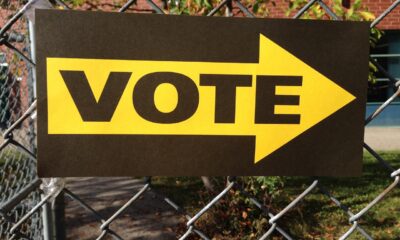Human Interest
Socialism by definition and degree
Socialism has at least six degrees, half of which don’t meet the strict conventional definition. But we all must recognize these quantum steps to avoid it.

The U.S. Presidential Election of 2020 will definitely give Americans a choice between freedom (and specifically capitalism) and socialism. The socialism advocates know this. So they have begun a disinformation and “gaslight”1 campaign about what socialism is – and is not. Therefore, to make an informed decision, the American people need some definitions. And these must be precise definitions, because socialism is in fact a matter of degree.
Socialism and its appeal
Regular readers of CNAV will recall that CNAV treated the appeal of socialism more than two and one-half years ago:
Then, CNAV offered these definitions of capitalism, socialism, and communism:
- Capitalism means private ownership and operation of everything in the economy except the police, the military, and the law courts.
- Communism means government ownership and operation of everything in the economy. The government assigns you to a school, then to a job. And instead of paying you, it dispenses rations of food, water, and whatever else the government deems necessary.
- Socialism means anything in-between. Socialism can have degrees. Communism and capitalism are absolutes. They exist at the ends of the political-economic continuum.
Furthermore, CNAV treated the appeal of socialism, and to what it appeals. Socialism appeals to:
- Risk-aversion, for those who don’t want the responsibility for providing for themselves,
- National pride in “special projects” other than military (or police), and
- A mystical concept of “true communism” and a promise of superabundance.
The gaslight campaign
To gaslight a person means to invalidate systematically that person’s concept of self, external events, or both.2 Which is what the advocates of socialism must do. They may not openly advocate for their vision in America today, not without confusing Americans’ understanding of the concept. When the then guardians of the Star Trek franchise decided to advocate for socialism openly, even they dared not mention it by name. Instead they called it “The New Economy.”
What is socialism? Even its advocates don’t seem to agree!
Today’s advocates confuse the issue two ways. Protest yet another usurpation of private industry by government and they will say,
But you don’t know what socialism is! Providing this one thing is not socialism. It is caring for your fellow man, something you might learn will help you.
And then Senator Bernard Sanders (I-Vt.) says:
When I talk about democratic socialist, I’m not looking at Venezuela. I’m not looking at Cuba. I’m looking at countries like Denmark and Sweden.
Oh, really? Ask a Dane or a Swede and he will remind you sharply that their countries’ governments do not own heavy industries. Therefore, they do not consider their countries socialistic. (Neither do the Norwegians.) And they certainly will not welcome a comparison to a failed state like Venezuela! Nor a slowly dying or at least stagnant one like Cuba.
An adequate definition must define degrees
Two and a half years ago, CNAV said socialism may have degrees. The present gaslight campaign clearly shows the need to say much more. In short, not merely to say that socialism has degrees but to say what those degrees represent.
To craft an adequate definition, CNAV turns to the Society of Automotive Engineers. They now define automotive autonomy by degrees, or levels, to which a car or truck takes control away from a human driver. At the highest level, a car wouldn’t even have manual or pedal controls. At the lowest, the car provides a minimum of assistance, like conventional automatic speed control.
Herewith a definition of the degrees, not only of socialism but of its competing ideologies of capitalism (full personal autonomy and responsibility) and communism (total government authority and responsibility over every aspect of a person’s life).
Against socialism: anarcho-capitalism
Anarcho-capitalism means literally that everything is private. It holds the individual, alone or in association with others who join together with vountary consent, responsible not only for economic well-being but also for physical security. Government does not exist. First response comes from whoever sees an emergency situation, or from some group who planned a response ahead of time. Fifty years ago, CNAV would guess first response would be in the hands of the Boy and Girl Scouts.
Minimal government
The minimum level of government that Ayn Rand, founder of Objectivism, proposed, limits itself to:
- Management of the use of force in retaliation against those who initiate its use. While the individual retains absolute authority to use force in self-defense, here the government reserves to itself the authority to retaliate against an aggressor or pro-actively destroy a potential aggressor’s ability to aggress. Retaliation goes beyond self-defense and involves judgment and punishment. To that end the minimum government has:
- Police
- Military
- Judiciary
- Emergency first response. An emergency arises when life is at immediate hazard through no fault of the person at hazard. So emergency first response includes fire brigades, and hospitals for the treatment of casualties of accidents or violent acts. This would also include offices of:
- Medical examiners (physicians who examine bodies of those who die under suspicious circumstances), and
- Coroners, who pro-actively inquire into the circumstances of a suspicious death (the inquest).
The lowest level of extra government: custom and tradition
Level 0: the government provides, in addition to the above, these “customary and traditional” government services:
- Delivery of various classes of mail and, exclusively or not, of small packages—the “post office.”
- Public streets, roads, and highways, and intra-city mass transportation, but not national-flag inter-city railroads or airlines.
- Hospitals within large cities, to serve their indigent populations.
- Minimal community news and entertainment platforms, which may or may not have nationwide networks—the “TV networks.”
(In ancient Rome, responsibility for public streets rested with the commissioners of streets, buildings, inspections, weights and measures—the aediles. But highways typically came under the families of their first builders. Highways became an exclusively governmental institution with the arrival of the Emperorship. With rare exception these have fallen within government purlieu ever since.)
The first two levels of socialism
Level 1 socialism or “social democracy”: government providing all the above, plus:
- A public charity providing in detail certain “minimum necessary” goods and services — “welfare”
- Any one of the following:
- National-flag railroad
- National-flag airline
- Free hospitals offering their services to everyone, regardless of circumstance
- A government-operated system of medical expense-coverage that competes with private insurance, limited (or not) to certain persons who “cannot afford” private insurance
Level 2 socialism: any government that provides “welfare” and two or more of the other services above. This applies especially to a government that provides:
- A guaranteed minimum income or ration, and/or
- A government-operated system of medical expense-sharing that forbids the operation of private insurance services, regarding the same to be no better than gambling and bookmaking.3
The last levels: the individual loses all autonomy and responsibility
Level 3 social democracy: a government that provides everything in Level 2 above but also starts, not just to buy “minimum” products but make them directly. Enter things like:
- The collective farm
- Government-operated heavy industry making more than weapons, uniforms, and the like. This is what Volkswagenwerk Aktiengessellschaft (“The People’s Car Works”) used to be under the Nazis.
Level 4 socialism: the government is the sole provider of a set of goods and services considered essential. It grudgingly allows private crafts for the production of toys and other “fripperies.” Taxes are high—ninety percent if you’re not a government industry employee.
Level 5: this is total communism. In it, to quote Actor Patrick Stewart in Star Trek: First Contact, “money does not exist.”The government holds all things in common and provides a daily ration of what it decides you should have.
Levels of socialism on Earth today
So where do America and other countries stand on this stepladder? Today every country on Earth has more than a “minimal government.” Even ancient Rome, with its grain dole, stood at Level 1. America stood at Level 0 for most of its history. But she started to climb (or more properly, descend) the ladder with the Presidency of Theodore Roosevelt. America moved deeper into Level 1 with the nationalization of rail passenger service – the National Rail Passenger Corporation, or “AmTrak”. With the Presidency of Barack H. Obama, America moved formally into Level 2.
The United Kingdom stood at Level 3 until Prime Minister (later Baroness) Margaret Thatcher took the country down at least to 2. Sweden, Norway, Denmark and Finland are at Level 2. Venezuela and Cuba are at 4; mainland China is perhaps at 3.
No country has ever gone all the way to Level 5 socialism – in which “money does not exist.” The Soviet Union tried that, then abandoned the attempt. Hence the ruble.
The actual desires of the advocates of socialism
When Senator Sanders pleads about “looking at countries like Denmark and Sweden,” he is, in fact, lying. We know he’s lying because he honeymooned in the Soviet Union and extolled what he saw as its virtues upon his return. Don’t let his lavish lifestyle, with the mansions and so on, fool you. He would claim that those things are his perquisites of good, unselfish service.
And he would have a precedent! Ancient Gallic tribes like the Aedui held their lands in common—but ranking chieftains “caretook” certain holdings. Rome and most of her allied cities likewise had public lands (ager publicus). But Roman Senators routinely “rented” these lands long-term (the latifundiae).
Such traditional hypocrisy aside, the Democratic Party today wants socialism and indeed total communism. The public disputes among its prominent members constitute deceptive window dressing.
This election, as CNAV mentioned, presents a stark choice. A vote for the Democratic Party today, at any level, is a vote for socialism.
Editor’s Notes
1 Cf. Gaslight, dir. George Cukor; with Ingrid Bergman, Charles Boyer, Joseph Cotten, and Angela Lansbury; MGM, 1944.
2 Patrick Hamilton made the concept famous with his original stage play Gaslight. This play formed the basis of two motion pictures, the second of which (1944) became more memorable.
3 In The Moon is a Harsh Mistress (Robert A. Heinlein), a character answers a critic who calls him an ingrate for not wanting to support certain government services. Among them: “Medical insurance – we have that but apparently not what you mean by it. On Luna, if a man wants insurance, he goes to a bookie and works out a bet. You can hedge anything, for a price.” True enough, a conventional insurance company does “make book” on risk. That does not in and of itself make it illegal. Nor does it imply that government and only government ought to share either risk or expense.
About the image
“‘Liberate America’” by Tony Webster is licensed under CC BY 2.0
Terry A. Hurlbut has been a student of politics, philosophy, and science for more than 35 years. He is a graduate of Yale College and has served as a physician-level laboratory administrator in a 250-bed community hospital. He also is a serious student of the Bible, is conversant in its two primary original languages, and has followed the creation-science movement closely since 1993.
-

 Civilization3 days ago
Civilization3 days agoWhy Europe Shouldn’t Be Upset at Trump’s Venezuelan Actions
-

 Executive4 days ago
Executive4 days agoHow Relaxed COVID-Era Rules Fueled Minnesota’s Biggest Scam
-

 Christianity Today3 days ago
Christianity Today3 days agoSurprising Revival: Gen Z Men & Highly Educated Lead Return to Religion
-

 Civilization4 days ago
Civilization4 days agoThe End of Purple States and Competitive Districts
-

 Executive4 days ago
Executive4 days agoWaste of the Day: Can You Hear Me Now?
-

 Executive5 days ago
Executive5 days agoWaste of the Day: States Spent Welfare in “Crazy Ways”
-

 Civilization2 days ago
Civilization2 days agoDeporting Censorship: US Targets UK Government Ally Over Free Speech
-

 Executive2 days ago
Executive2 days agoWaste of the Day: Wire Fraud, Conflicts of Interest in Connecticut











[…] Socialism by definition and degreeParis Agreement: Climategate 3.0 […]